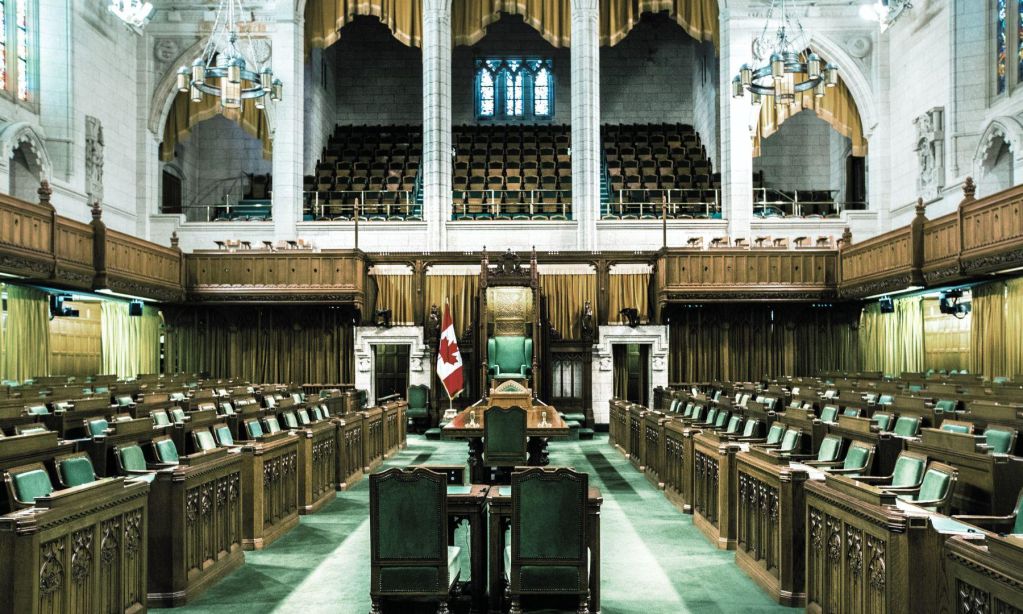Members of Parliament are returning to the legislature today, amidst historically low polling numbers for the ruling Liberals and mounting support for the opposition Conservatives.
The minority parliament—with Liberals in a supply-confidence agreement with the New Democrats—has, at most, until October 20, 2025 before a new election, but the parties could theoretically call an election at any time. What, then, should we expect in this politically crucial moment for all parties?
A federal budget is coming
As is the case for every spring session of parliament, Canadians can expect a federal budget at some point over the next two months. That document is always an outline of a sitting government’s priorities, but that takes on added significance in the lead up to an election.
Katherine Scott, a senior researcher at the Canadian Centre for Policy Alternatives, says that “the federal government has been at pains to lower expectations in the upcoming budget,” pointing out that it is “under acute pressure from the business lobby to constrain spending and reduce debt.”
Scott points to comments from Deputy Prime Minister and Finance Minister Chrystia Freeland last fall.
“Canadians are worn out, frustrated and feeling the squeeze,” Freeland said in her speech to parliament on the release of the 2023 Fall Economic Statement (FES). “What Canadians deserve today is for us to address the very real pain that so many are feeling—with a hopeful and achievable vision for our country's future.”
“Canadians are still waiting,” Scott says. “The FES delivered only a modest boost to existing housing investments, promising as well to crack down on short-term rentals and the lack of action on the part of grocery store giants to rein in the high cost of food. These efforts were never going to make an appreciable dent in the deteriorating balance sheets of low- and modest-income households.”
Ricardo Tranjan, CCPA senior political economist, expects much of the same for housing, both in the coming budget and beyond. “The federal government,” he says, “will likely roll out measures announced in 2023 with few, if any, surprises.”
He expects to see more deals with municipalities as part of the Housing Accelerator Fund—which he describes as “an overall good initiative,”—but hits the feds on their “persistent lack of resolve” when it comes to actually tackling housing affordability.
“Expect to see a budget of half measures in the spring and more private sector incentives,” Scott says, “from housing to health care to climate action and transportation.”
Is pharmacare on the way?
The one place where observers expect we might see big news is in pharmacare—one of the final unaddressed pieces of the Liberal-NDP supply-confidence agreement.
CCPA Senior Economist David Macdonald points out that “the supply confidence agreement targeted a pharmacare plan for 2023,” he says. “That didn’t happen, and both parties decided to put off a plan announcement until March 2024.
“Conveniently, that lines up with the month the federal budget is traditionally released,” Macdonald says, pointing out that a pharmacare plan would “certainly make a centrepiece for the budget.”
Macdonald, who recently authored a report on sizeable gaps left in the federal dental care plan, has some concerns that the pharmacare plan may have similar problems. Rather than a truly universal program, the dental care plan takes a “fill-in-the-gaps approach,” he says, which leaves millions of families who make a combined income over $90,000 without access to the public plan. Macdonald also points out that, under the dental plan, there is no guarantee of access like there is for other medical care.
“If you don’t have a dentist in your community,” he says, “that’s still your problem. I’m quite concerned we’re going to see a carbon copy on the pharma side.”
The NDP, for its part, says that it is drawing a “line in the sand” around pharmacare delivery. MP Don Davies, who is leading negotiations with the Liberals, says that the party is “battling for the proper way to deliver prescription medicine to Canadians, and that’s through our public system” as opposed to a mixed system.
Davies is “optimistic” that legislation will be tabled by March 1.
No big surprises on climate
“Most of this government’s outstanding climate agenda has moved from the legislative to the regulatory phase,” says CCPA Senior Researcher Hadrian Mertins-Kirkwood.
The biggest legislative news is likely to be in the Sustainable Jobs Act, the government’s legislation, which is meant to create and guide supports for workers and communities affected by decarbonization. That legislation is still working its way through readings and committees and could see some changes.
“As it stands,” Mertins-Kirkwood says, “the Sustainable Jobs Act amounts to no more than a plan to make a plan. We’ll need to wait years for this accountability framework to produce any kind of tangible support for people on the ground.
“Workers concerned about their future in the fossil fuel industry will find little in this bill to get excited about.”
Beyond that law, Mertins-Kirkwood expects to see some movement on the zero-emissions vehicle sales mandate, an oil and gas industry emissions cap, and further incentivization—such as tax credits—for green industry, in keeping with the government’s strategy which relies on the private sector. Such measures, he says, are “essential for achieving the transformational economic changes the Liberals have long promised.”
A new trade deal with Ecuador
Stuart Trew, CCPA senior researcher focused on trade, is expecting the feds to make further advances on a new free trade agreement with Ecuador, which they announced in December.
That country, which is currently undergoing a major crisis as gangs engage in open war with the government, has an “extremely poor human rights and Indigenous rights record,” Trew says. “Only last year, the former president passed an executive decree allowing mining companies to run roughshod over Indigenous communities who oppose their projects.”
A significant number of those mining companies are headquartered in Canada. Trew points out that significant sections of Ecuadorian civil society, from trade unions to Indigenous groups and human rights organizations, oppose the trade deal.
The Liberals have long championed what they call “inclusive trade,” a framework that is meant to rehabilitate the international free trade legal apparatus following decades of widespread criticisms that it prioritizes corporate profit over workers’ rights, indigenous rights, women’s rights, the environment, and so on.
Trew asks: “Will this be the year the wheels fall off the Trudeau government’s ‘inclusive trade’ bus?”
Mixed messages on immigration
Immigration Minister Marc Miller’s sudden announcement on Jan. 22 that he would be substantially reducing the number of international student visas—down a whopping 35 per cent overall—came as a surprise to many observers.
The cut is likely to provoke some major funding problems in postsecondary institutions, says CCPA National Office Director Erika Shaker. Decades of underfunding universities has led those institutions to disproportionately rely on ballooning international student tuition.
“The issue of treating international students like cash cows isn't new,” Shaker says.
“As public funding for universities and colleges has become increasingly insufficient over the past three decades, institutions have turned to making up the difference by charging exorbitant fees to international students—and, more recently, out-of-province students.”
While critics of this measure say that it unfairly targets immigrants and international students, the feds are also signalling some possible pro-migrant measures could be on the horizon. Just a month prior to his announcement on international students, Miller had announced that his ministry is working on a springtime plan to create a path to permanent residency for the estimated 300,000-600,000 people in Canada who lack formal status. Such a regularization program has long been the demand of migrant justice organizations in Canada, and Prime Minister Trudeau outlined it as a priority in the post-election mandate letter in 2021.
The end of the supply confidence agreement?
“I believe this session of parliament will finalize the Liberal-NDP supply and confidence agreement,” David Macdonald says.
This minority parliament—now two elections deep—is being held up by a supply confidence agreement between the Liberals and the NDP. The two parties agreed to work together to pass a number of specific policies during their mandate. Nearly all of those policies—child care, dental care, a Canada Disability Benefit, federal anti-scab legislation, and pharmacare—are now either passed, or appear to be on track to do so.
“The new Canada Disability Benefit is now under development and we may see the details in Budget 2024, ditto for pharmacare,” Katherine Scott says.
“These programs are potential game changers,” she says, “but what’s needed is a comprehensive plan to tackle Canada’s broken housing system and to strengthen our social safety net.”
As it stands, though, it doesn’t seem that any of the parties involved have plans to enact such a comprehensive plan, which falls outside the scope of the agreement.
Once the supply and confidence agreement comes to an end, then the countdown to the election begins.







